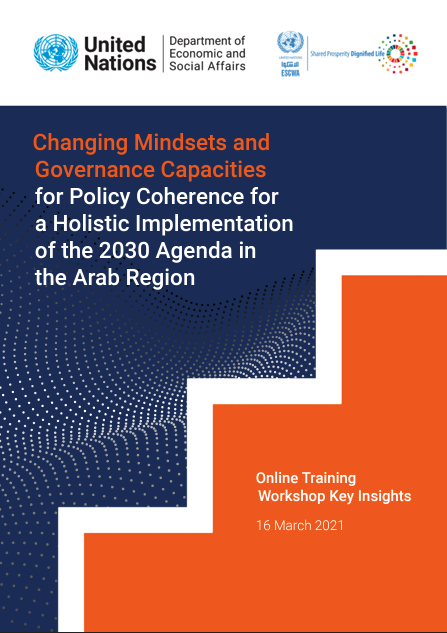
This report summarizes the key messages that were conveyed by facilitators, participants and external speakers during the online training workshop on “Changing Mindsets and Strengthening Governance Capacities for Policy Coherence for a Holistic Implementation of the 2030 Agenda in the Arab region”. The four-day workshop was organized by the United Nations Department of Economic and Social Affairs of the United Nations (UN DESA), through its Division for Public Institutions and Digital Government (DPIDG) and the United Nations Economic and Social Commission for Western Asia (UNESCWA). It was held virtually on 26 and 28 January and 2 and 4 February 2021 and was joined by a number of public servants from Bahrain, Morocco and Oman, working in policy planning, finance, human resources, information technology and statistical functions of different national government departments.
The workshop aimed to raise awareness and develop capacities among senior public servants from the Arab region on the need for effective institutional arrangements for holistic policy coherence to implement the 2030 Agenda for Sustainable Development. It also highlighted the importance of changing mindsets and key competencies needed for the implementation of the Sustainable Development Goals (SDGs). Furthermore, the workshop served to pilot draft material related to two training toolkits on “Strengthening Institutional Arrangements and Governance Capacity for Policy Coherence to implement the SDGs” and “Public Servants’ Mindsets and Capacities to Implement the 2030 Agenda for Sustainable Development“. The toolkits are part of the UN DESA “Curriculum on Governance for the SDGs".
Session 1 provided participants with an overview of governance capacities needed for policy coherence and changing mindsets in the context of the 2030 Agenda. It included an assessment of countries’ needs regarding institutional arrangements for policy coherence and changing mindsets (based on a pre-questionnaire) and familiarization with building blocks for policy coherence, various institutional arrangements as well as mindset shifts at multiple levels (individual, organizational and institutional) that are desirable to promote policy coherence.
Session 2 focused on planning and systems thinking. Participants discussed their countries’ policy priorities, linking them to system thinking, long-term planning and monitoring policies in an integrated manner, taking also into consideration the importance of politics in the policy cycle. The session also stressed the importance of experimental and strategic mindsets to implement the SDGs and realize the principles of the 2030 Agenda.
Session 3 focused on cross-governmental and inter-ministerial collaboration, including discussions among participants on the importance of different types of mindsets needed for collaboration. The session also featured peer-to-peer learning among countries that have promoted policy coherence through a roundtable discussion on institutional arrangements for policy coherence and changing mindsets.
In Session 4, participants discussed gaps, challenges and strategies of multi-stakeholder engagement based on the readiness assessment and reflected on actions that could be planned as a takeaway and triggers for change upon completion of the training.
File added date: 30 August 2021
Author: UN DESA/DPIDG
Download the report: English
 مرحباً بكم في الأمم المتحدة
مرحباً بكم في الأمم المتحدة 